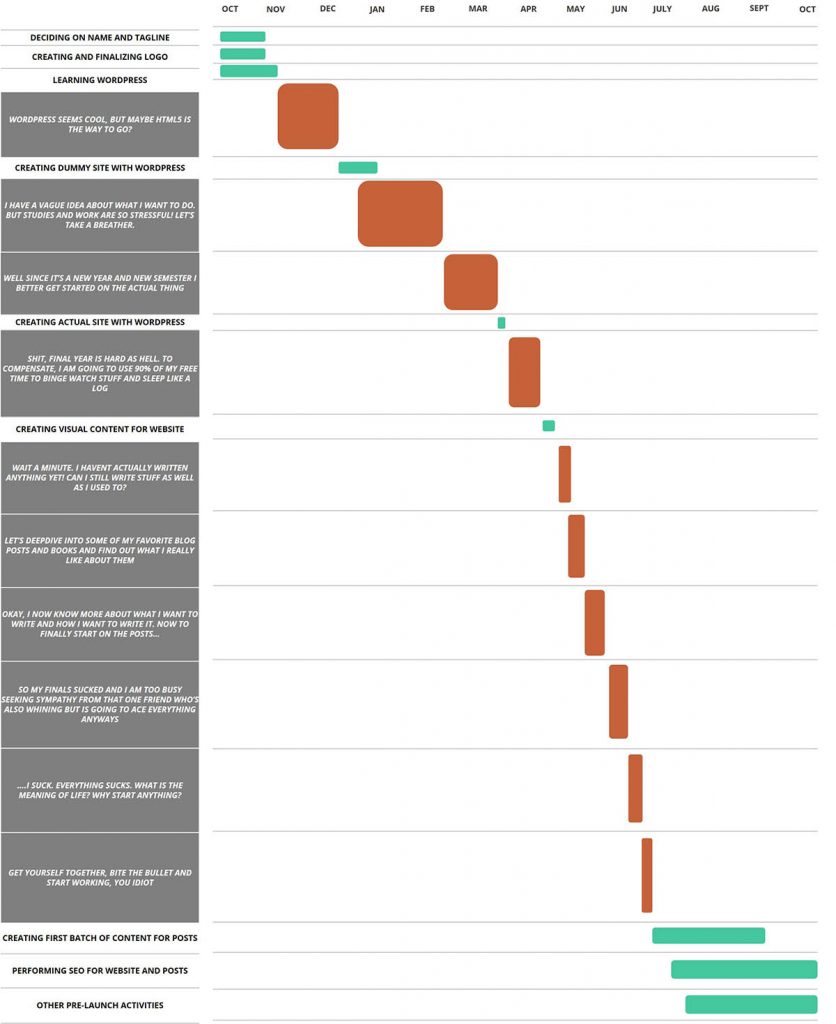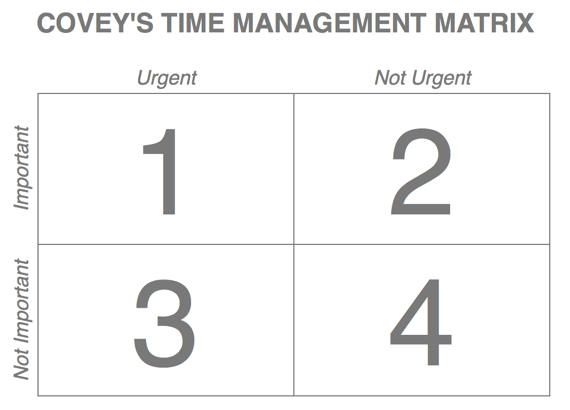Since this is actually the first article I am writing for UpThrust, now would be a good time to talk a little bit about how this all got started.
I started working on UpThrust last October. It originally started out as business model for an Entrepreneurship course assignment. Soon after, I decided to put my money where my mouth was and prototype the idea through a personal blog.
That meant coming up with a name and tagline and also deciding on the content structure and positioning. I also had to take a crash course on WordPress to build the site from scratch.
Now, a one-year timeline for launching this site might look like this:

But this is what actually happened:

Holy shit. That’s a whole lot of doing nothing, followed by hyperventilating about doing nothing.
Mind you, UpThrust is pretty high on my list of important things to do. I have spent sleepless nights thinking about it and working on it. I have forgone several opportunities in both my social and work life to get UpThrust into shape. Why would I procrastinate so much when it came to UpThrust?
This is because I procrastinate in pretty much everything I do. Procrastinators, like yours truly, number around 26% of the population. This is sizeable by itself, but it rockets up to a whopping 95% for students in higher education.
Why do People Procrastinate?
Wiser (and funnier) persons than me have tried to explain procrastination throughout the last couple of years. Taken together, some of the prevailing theories can shed some light on why people keep procrastinating over and over again.
First of all, there are two types of procrastinators:
- Narcissistic Assholes: These people make a conscious choice to procrastinate. They don’t value others’ time and effort — much less their own. They just don’t care, and it’s just as frustrating and drab as it sounds.
- Self–Loathing Chronic Procrastinators: To put it simply, these people have problems. They know they are always late, and they feel horrible about it. Most of the time they never manage to do much about it. It’s this second group that we will explore at length here.
There are a couple of perspectives on why chronic procrastinators are the way they are.
They Like the Rush of Putting Things Off Until the Last Minute
This is how a lot of procrastinators start off, especially those who seem productive from the distance and get a lot of work done. When you get closer though, you notice that they are insane. They wait around until the very last moment because they want to be the hero who arrives right in the nick of time.
I started off this way myself. I know it sounds like a very asshole thing to do, and I would be lying if I said it wasn’t. You get this incredible thrill from doing things at the last minute, especially things you are good at. You want to prove that you are that damn good.
Mostly, you end up frustrating others and overexerting yourself in a way that’s just not sustainable in the long run.

They are Perfectionists
Sometimes, procrastinators think too much about just how perfect and great they want their work to be. The fear of falling short becomes too great. They avoid it by putting off doing this work for as long as they can. This is the sort of procrastination that you frequently see in writers, or in fact in any kind of creator.
The perfectionists start off by setting unrealistically high expectations. They see their work as this vague, nascent thingamajig. They have this grand vision propped up in their minds. This vision, however, is a strawman; it’s a cardboard cutout of a dream house you don’t actually know how to build.
The perfectionist just dreams about the light at the end of the tunnel. He ignores and dreads the arduous effort he has to put in to actually get through the long, dark tunnel in the first place.
Because, you see, turning that dream into reality requires a lot of effort, and the procrastinator would rather not do that right now. It’s too much pressure!
They Are Always Trying to Avoid Something They Don’t Want to Do
A penchant for perfectionism explains a lot about how people procrastinate when it comes to work they are passionate about.
But what about work you don’t really like and just want to get over with? You probably don’t give two figs about that term paper for that blow-off course. So it makes perfect sense for you to get it done as quickly as possible so you can enjoy the finer things in life, right?

You see, procrastinators are always trying to put off doing things they don’t want to do. This is the big reason behind procrastination.
This is a shaky way of dealing with your problems, and it falls apart hilariously when you give it a closer look. The procrastinator feels guilty all the time he’s not working on the thing he’s supposed to do.
He knows he is just making things worse for himself and others the longer he procrastinates. The more he procrastinates, the more resigned he becomes to his fate. He starts hating himself for being such a lazy bum who never gets shit done.
Tim Urban talks about this kind of procrastination at length in his blog, Wait but Why. If you feel too lazy right now to read it, watch this TED talk he gave on the subject instead.
The Common Element
One underlying theme ties all of these behaviors together: fear of commitment.

The thrill seeker is afraid to commit to his work and to his responsibilities to others invested in his work.
The perfectionist is afraid of embracing the possibility of failure, and that’s a hard pill to swallow for many.
Finally, not wanting to do unpleasant things shows a fear of commitment to reality. The dread of doing something the procrastinator doesn’t want to do prevents him from accepting that this is something he has to do, on his own.
How Procrastination Impacts Your Life
Obviously, procrastination costs you a lot of time. To illustrate how that exactly works out, I am going to use Stephen Covey’s Time Management grid.

While procrastinators are quite afraid of Quadrant I activities, they are terrified of Quadrant II tasks. Quadrant II tasks take a lot more hands on planning and time management than the rest. Taking that kind of proactive approach is an obvious no-no for commitment-phobes.
So the procrastinator spends most of his time avoiding Quadrant II activities. How his time is actually split among the rest of the three quadrants varies from person to person, and over time.
The guy who seems to be exhausted as hell, busy with handling one crises after another with no time for the finer things in life spends most of his life in Quadrant I. The person who keeps himself busy with day-to-day chores stays in Quadrant III, and the consummate slacker who just sits on his couch and stares into a screen all the day spends time in Quadrant IV.
I have been all three one time or the other, and it sucks equally in all three cases.
What Does This Mean?
What this all translates to is this: if you are a procrastinator, you are probably not going to work on course work that’s due one month, a week or even two days from now. You probably aren’t going to start exercising, or start working on that novel you have talked about for so long, or ask out that cute girl you have been crazy about for ages.
You are also likely to be mess: eat less, sleep less and be more likely to try out drugs and alcohol. If you are a full-time crisis manager who spends all of his time in Quadrant I, you rarely see your friends and family because you are busy with work all the time. Also, you are probably depressed every now then, because you hate how much of a total mess you are.

You know that you can change all of this, if you just put your foot down and started fixing and doing everything you normally put off. But that sounds like hard work and commitment, and those are things that you would rather not do right now.
Can you Overcome Procrastination?
Well, yes you can. But it’s not something you can accomplish in a day or two. Since I have already taken a lot of your time, I will let this baboon explain it for me and not keep you waiting much longer.

I am eventually going to put together a follow-up post about dealing with procrastination. But then again, it’s a Quadrant II activity, so who knows if it’s every going to see the light of day!






















